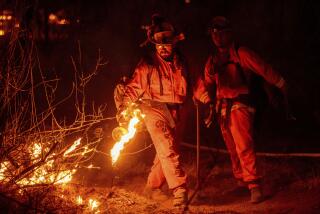Sunni Leader Says Video Shows Abuse
- Share via
BAGHDAD — Iraq’s prison abuse scandal spilled anew into the election campaign Monday as a leading Sunni Arab legislative candidate released a video purporting to show tortured detainees at a Baghdad palace used as a government prison.
Saleh Mutlak’s party also accused the government of delaying the results of an investigation of alleged abuses until after Thursday’s parliamentary election. Iraqi and American officials had already uncovered two other Interior Ministry detention facilities where prisoners had been mistreated.
Prime Minister Ibrahim Jafari told reporters that his government was investigating every Iraqi prison for human rights abuses, and he denied foot-dragging.
“Even those who are sentenced to death, I will not allow anyone to cause him harm before the execution,” Jafari said.
Farouq Mohsin Khalil, a spokesman for the Human Rights Ministry, called the allegations baseless. U.S. officials could not confirm the report.
The issue is a potentially explosive one. American officials believe Sunni Muslim disaffection has fueled the insurgency and hope the upcoming vote will bring Sunnis back into the political process, undermining support for the rebels.
But Sunnis charge that Iraqi security forces have been infiltrated by Shiite Muslim militiamen who have tortured and even killed detainees.
Footage of the alleged torture victims was broadcast on pan-Arab satellite television Monday. Mutlak’s party, the Iraqi National Dialogue Front, distributed copies of a DVD it said showed the testimony of detainees that was taped at a prison in the Al Salam Palace, which had belonged to former President Saddam Hussein during his rule.
A copy of the DVD provided by the party showed a large crowd of men inside a bare room. Taking turns talking on camera, the men complained of beatings and torture. Some of them showed what appeared to be burns and bruises.
Maj. Gen. Rasheed Flayih Mohammed, commander of the Interior Ministry’s special forces, denied that prisoners in the facility had been mistreated. He said inmates are treated well, permitted visits by family members and allowed to use mobile phones.
“Let anyone come and take films and pictures, and let them publish it,” he said. “We have nothing to hide.”
Allegations of torture have been an issue at the center of the election campaign.
On Monday, the bodies of four Sunni men were found handcuffed and blindfolded in Dora, a neighborhood in southern Baghdad, said an Iraqi official who requested anonymity for security reasons.
The bodies of dozens of Sunnis have been found around the country in the last year. Some were pulled out of the Tigris River, others from garbage dumps. In many cases, relatives said the victims had been arrested by men clad in uniforms worn by security forces.
Last month, U.S. soldiers discovered a secret prison during a raid of an Interior Ministry bunker in Baghdad’s Jadiriya neighborhood. Inside, they found 169 people, most of them Sunnis. Some showed signs of severe mistreatment and malnourishment.
The discovery prompted a sharp rebuke from U.S. Ambassador Zalmay Khalilzad.
Jafari ordered an investigation, but the report has been delayed, and the Interior Ministry’s inspector general, Nori Nori, lost his job Dec. 1 without explanation.
On Thursday, an Iraqi-American team of investigators and other officials found 13 people who needed hospital care at another Ministry of Interior detention facility in Baghdad.
Army Lt. Col. Barry Johnson, a U.S. military spokesman, said the search was part of a nationwide investigation of prisons. The team includes lawyers and a doctor from the United States and inspectors from Iraq’s ministries of interior, justice, defense and human rights.
The FBI and other U.S. Justice Department agencies also are helping with investigations, State Department spokesman Adam Ereli told reporters in Washington.
“Clearly there’s a problem in Iraq, and clearly the Iraqis understand that and we are working to address it,” Ereli said.
The 13 prisoners were taken to a hospital for unspecified treatment. The Iraqi Human Rights Ministry, which is leading the investigation, said the search had turned up a number of problems at the facility, including overcrowding. After the search, Iraqi judges ordered the release of 56 detainees.
Politicians continued campaigning Monday, and early voting began among soldiers, prisoners and hospital patients. Nearly 90% of eligible detainees held by coalition forces voted, the U.S. military said.
In an Iraqi-run prison in the southern city of Samawah, only a few detainees abstained from voting, local officials said. “It’s a real democratic practice,” said Abdul Razzaq, a 44-year-old inmate. “No one forced us to vote for a certain slate.”
He said he had voted for a secular slate led by former interim Prime Minister Iyad Allawi because “it contains educated and technocratic people.”
Attacks in Baghdad killed four police officers and three civilians Monday. One led to a 30-minute gun battle on a highway and another occurred in the upscale Mansour neighborhood.
Also Monday, an American soldier was killed south of Baghdad when his patrol struck a roadside bomb.
In Fallouja, west of the capital, a suicide bomber in a taxi attacked a convoy of Marines, wounding one serviceman, the military said.
Several insurgent groups denounced the election but made no threats to disrupt it, Associated Press reported.
*
Times staff writers Richard Boudreaux, Borzou Daragahi, Saif Rasheed and Raheem Salman in Baghdad and special correspondent Hassan Halawa in Samawah contributed to this report.
More to Read
Sign up for Essential California
The most important California stories and recommendations in your inbox every morning.
You may occasionally receive promotional content from the Los Angeles Times.













